 Hopefully you've read the amazing opinion offered by the conservative, Reagan-appointed appellate court Judge Richard Posner by now, absolutely demolishing both Wisconsin's Republican-enacted Photo ID voting law, and pretty much all others --- including the first-in-the-nation such law in Indiana that Posner himself was responsible for upholding back in 2008!
Hopefully you've read the amazing opinion offered by the conservative, Reagan-appointed appellate court Judge Richard Posner by now, absolutely demolishing both Wisconsin's Republican-enacted Photo ID voting law, and pretty much all others --- including the first-in-the-nation such law in Indiana that Posner himself was responsible for upholding back in 2008!
If not, go read it and then come back. It's that good and that important. Either way, we may have a bit more to say about it in the near future, as it's an absolutely landmark opinion on this issue --- one that we've been covering at The BRAD BLOG for more than a decade now --- even as a dissent.
But there's one fairly amazing sidebar to all of this, at least to me, that I've been meaning to note here --- if only because it seems so bizarre...
Wisconsin's Photo ID restriction was first struck down by the U.S. District Court back in April of this year, in a lengthy, detailed opinion by Judge Lynn Adelman (a Democratic appointee to the federal bench) after a full trial on the merits of the law. He found the GOP statute to be both unconstitutional and a violation of the federal Voting Rights Act.
Then, in September, the state appealed to a 3-judge panel on the 7th Circuit. The three 7th Circuit judges randomly selected to hear the appeal were all Republican appointees. They reversed Adelman's ruling, with little comment.
Next, the ACLU filed for an Emergency Petition for Rehearing En Banc, in hopes of receiving a hearing by the full panel of jurists on the 7th Circuit Court (one of whom is Posner, who had previously allowed Indiana's Photo ID restriction from the same court). The ACLU petition was denied in a deadlocked 5 to 5 vote of the full court. The three judges who had already reversed the District Court voted against a hearing by the full court, along with two other Republican appointees. (The five GOPers did so based on all manner of falsehoods but that's neither here nor there for purposes of this quick item.) On the other side, Posner, and one more Republican appointee, as well as three Democratic appointees voted to rehear. But a 5-5 tie vote, in this case, meant the dismissive ruling of the original 3-judge panel of Republican appointees was upheld.
The U.S. Supreme Court voted a few days later to vacate the 7th Circuit's reversal, for now. Rather than having been based on the full merits of the case, which they have yet to hear at the High Court, the Supremes decision seems to have been largely based on the fact that the 7th Circuit's order was resulting in electoral chaos in Wisconsin, as the ruling had been made so close to the November election, which SCOTUS has cautioned against in past cases.
But what all of that is meant to highlight, is that, until SCOTUS stepped in to temporarily block the 7th Circuit's reversal, a total of six (6) federal judges had voted against the WI Photo ID voting restriction law (the U.S. District Court judge and five more judges on the 7th Circuit), while just five (5) federal judges had voted in favor of the voting restrictions (the five Republicans on the appellate court). Nonetheless, even with the support of a minority of federal judges who examined the case, without the SCOTUS order, the law would have been implemented in WI this year, risking the disenfranchisement of some 300,000 legally registered voters.
Crazy judicial system we have in this country, eh? While the U.S. Constitution is meant to protect the minority against the tyranny of the majority, I don't think that this is what is meant by that!
I'm not an attorney, so maybe that kind of counter-intuitive math is not all that unusual in our legal/judicial system, but it seems fairly astonishing to me. A minority of federal jurists supported the idea that the statute was legal and Constitutional, while a majority did not. Yet, it would have been implemented anyway, save for the last-minute 6-3 decision by the Supreme Court.
(As long as we're doing the math, if we include the SCOTUS Justices here, there are now 12 federal jurists on record as having voted against WI's GOP voting restriction, while only 8 have voted in favor of it. But, given that only the judges on the U.S. District Court and the U.S. Court of Appeals were actually voting on the merits of the case, that's not really a fair number to apply here at this time. No doubt, a full hearing on the Constitutionality of Photo ID voting restrictions, like the one WI is still attempting to impose, will eventually make its way to the Supremes, at which time, the dissent of Judge Posner will likely be very important.)
One other point worth noting for now we have reported previously, but it bears repeating. As our crack legal analyst Ernie Canning detailed after the 7th Circuit's 5-5 deadlock resulted in upholding the 3-judge panel's reversal of the District Court ruling which previously struck down the law, that appellate court actually has eleven seats. One seat has remained empty since 2010!
Had Obama and Democrats in the U.S. Senate managed to overcome the endless GOP filibusters long ago and/or confirmed someone to the seat after they did away with the filibuster on federal judges in the U.S. Senate last November --- almost a year ago --- the disposition of the WI case would likely have been very different. While we can't know for certain, there's a very good likelihood that a Democratic appointee would have joined three D colleagues and two R colleagues on the 7th Circuit to uphold the original District Court ruling in a bi-partisan 6 to 5 vote, as opposed to the partisan deadlocked that went to the Republicans fighting for this disenfranchising law.
But, as we've seen now for years in the U.S. Senate, the minority --- so long as its Republican, anyway --- seems to rule there as well.
(Snail mail support to "Brad Friedman, 7095 Hollywood Blvd., #594 Los Angeles, CA 90028" always welcome too!)
|


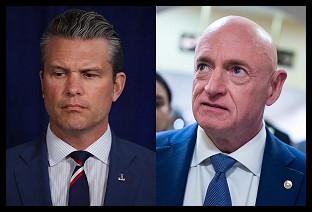 Court Blocks Hegseth Censure of Sen. Mark Kelly
Court Blocks Hegseth Censure of Sen. Mark Kelly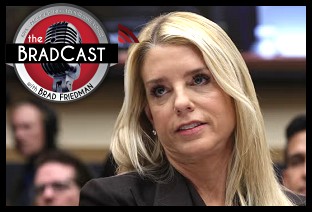 Harpy Tantrums, Legal Losses, Election Fails, Retreating ICE and Other Hopeful Signs: 'BradCast' 2/12/26
Harpy Tantrums, Legal Losses, Election Fails, Retreating ICE and Other Hopeful Signs: 'BradCast' 2/12/26 'Green News Report' 2/12/26
'Green News Report' 2/12/26
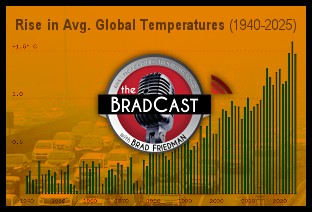 'Let Kids with Asthma Suffer': Trump to Reverse EPA's Landmark 'Endangerment Finding': 'BradCast' 2/11/26
'Let Kids with Asthma Suffer': Trump to Reverse EPA's Landmark 'Endangerment Finding': 'BradCast' 2/11/26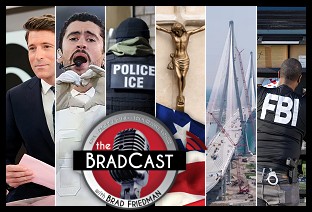 Trump's Presidency Now About Little More Than Racism, Corruption, Culture War Nonsense: 'BradCast' 2/10/26
Trump's Presidency Now About Little More Than Racism, Corruption, Culture War Nonsense: 'BradCast' 2/10/26 'Green News Report' 2/10/26
'Green News Report' 2/10/26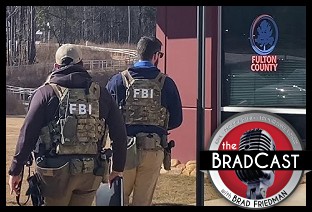 About Trump's FBI Raid of the Fulton County, GA Elections Warehouse: 'BradCast' 2/9/26
About Trump's FBI Raid of the Fulton County, GA Elections Warehouse: 'BradCast' 2/9/26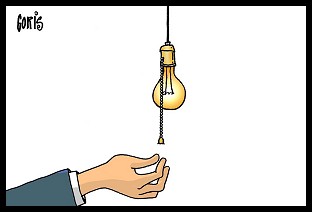 Sunday 'Dead in Darkness' Toons
Sunday 'Dead in Darkness' Toons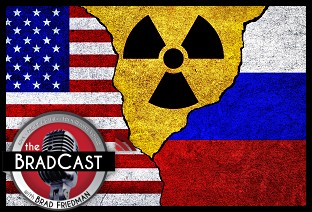 'New START' Treaty Allowed to End Amid New World Disorder: 'BradCast' 2/5/26
'New START' Treaty Allowed to End Amid New World Disorder: 'BradCast' 2/5/26 'Green News Report' 2/5/26
'Green News Report' 2/5/26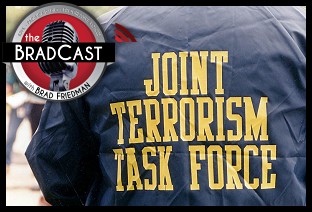 Trump Turns 'War on Terror' Tools Against Domestic Political Foes: 'BradCast' 2/4/26
Trump Turns 'War on Terror' Tools Against Domestic Political Foes: 'BradCast' 2/4/26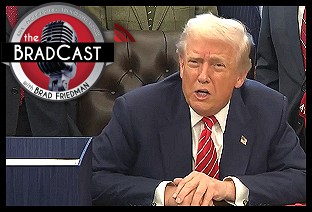 Losing Legally and Politically, Trump Threatens to 'Nationalize' Elections: 'BradCast' 2/3/26
Losing Legally and Politically, Trump Threatens to 'Nationalize' Elections: 'BradCast' 2/3/26 'Green News Report' 2/3/26
'Green News Report' 2/3/26 Bad and Good Bunnies, and an Electoral Shock in Deep 'Red' TX: 'BradCast' 2/2/26
Bad and Good Bunnies, and an Electoral Shock in Deep 'Red' TX: 'BradCast' 2/2/26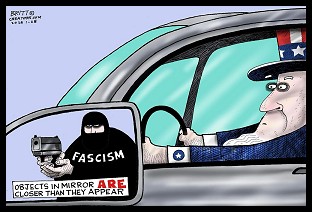 Sunday 'Mirror, Mirror' Toons
Sunday 'Mirror, Mirror' Toons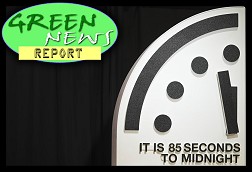 'Green News Report' 1/29/26
'Green News Report' 1/29/26 It's About Elections and the Windmills of His Mind: 'BradCast' 1/29/26
It's About Elections and the Windmills of His Mind: 'BradCast' 1/29/26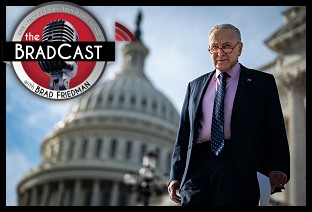 Govt Shutdown Over ICE Funding Near Certain This Weekend: 'BradCast' 1/28/26
Govt Shutdown Over ICE Funding Near Certain This Weekend: 'BradCast' 1/28/26 Trump Blinks, Bovino Out, MN Op Falters, Persists as Midterms Loom: 'BradCast' 1/27
Trump Blinks, Bovino Out, MN Op Falters, Persists as Midterms Loom: 'BradCast' 1/27  The ICE Murder of ICU Nurse Alex Pretti and the Heroes of Mpls: 'BradCast' 1/26/26
The ICE Murder of ICU Nurse Alex Pretti and the Heroes of Mpls: 'BradCast' 1/26/26  The BRAD BLOG: 22 Years and Still Counting
The BRAD BLOG: 22 Years and Still Counting Mr. Smith Testifies (Publicly) in Washington: 'BradCast' 1/22/26
Mr. Smith Testifies (Publicly) in Washington: 'BradCast' 1/22/26 World Turning Against Self-Destructing U.S. Under Trump: 'BradCast' 1/21/26
World Turning Against Self-Destructing U.S. Under Trump: 'BradCast' 1/21/26 Trump Waste, Fraud, Abuse on Voting, at DOJ, by DOGE: 'BradCast' 1/20/26
Trump Waste, Fraud, Abuse on Voting, at DOJ, by DOGE: 'BradCast' 1/20/26
 VA GOP VOTER REG FRAUDSTER OFF HOOK
VA GOP VOTER REG FRAUDSTER OFF HOOK Criminal GOP Voter Registration Fraud Probe Expanding in VA
Criminal GOP Voter Registration Fraud Probe Expanding in VA DOJ PROBE SOUGHT AFTER VA ARREST
DOJ PROBE SOUGHT AFTER VA ARREST Arrest in VA: GOP Voter Reg Scandal Widens
Arrest in VA: GOP Voter Reg Scandal Widens ALL TOGETHER: ROVE, SPROUL, KOCHS, RNC
ALL TOGETHER: ROVE, SPROUL, KOCHS, RNC LATimes: RNC's 'Fired' Sproul Working for Repubs in 'as Many as 30 States'
LATimes: RNC's 'Fired' Sproul Working for Repubs in 'as Many as 30 States' 'Fired' Sproul Group 'Cloned', Still Working for Republicans in At Least 10 States
'Fired' Sproul Group 'Cloned', Still Working for Republicans in At Least 10 States FINALLY: FOX ON GOP REG FRAUD SCANDAL
FINALLY: FOX ON GOP REG FRAUD SCANDAL COLORADO FOLLOWS FLORIDA WITH GOP CRIMINAL INVESTIGATION
COLORADO FOLLOWS FLORIDA WITH GOP CRIMINAL INVESTIGATION CRIMINAL PROBE LAUNCHED INTO GOP VOTER REGISTRATION FRAUD SCANDAL IN FL
CRIMINAL PROBE LAUNCHED INTO GOP VOTER REGISTRATION FRAUD SCANDAL IN FL Brad Breaks PA Photo ID & GOP Registration Fraud Scandal News on Hartmann TV
Brad Breaks PA Photo ID & GOP Registration Fraud Scandal News on Hartmann TV  CAUGHT ON TAPE: COORDINATED NATIONWIDE GOP VOTER REG SCAM
CAUGHT ON TAPE: COORDINATED NATIONWIDE GOP VOTER REG SCAM CRIMINAL ELECTION FRAUD COMPLAINT FILED AGAINST GOP 'FRAUD' FIRM
CRIMINAL ELECTION FRAUD COMPLAINT FILED AGAINST GOP 'FRAUD' FIRM RICK SCOTT GETS ROLLED IN GOP REGISTRATION FRAUD SCANDAL
RICK SCOTT GETS ROLLED IN GOP REGISTRATION FRAUD SCANDAL VIDEO: Brad Breaks GOP Reg Fraud Scandal on Hartmann TV
VIDEO: Brad Breaks GOP Reg Fraud Scandal on Hartmann TV RNC FIRES NATIONAL VOTER REGISTRATION FIRM FOR FRAUD
RNC FIRES NATIONAL VOTER REGISTRATION FIRM FOR FRAUD EXCLUSIVE: Intvw w/ FL Official Who First Discovered GOP Reg Fraud
EXCLUSIVE: Intvw w/ FL Official Who First Discovered GOP Reg Fraud GOP REGISTRATION FRAUD FOUND IN FL
GOP REGISTRATION FRAUD FOUND IN FL

































